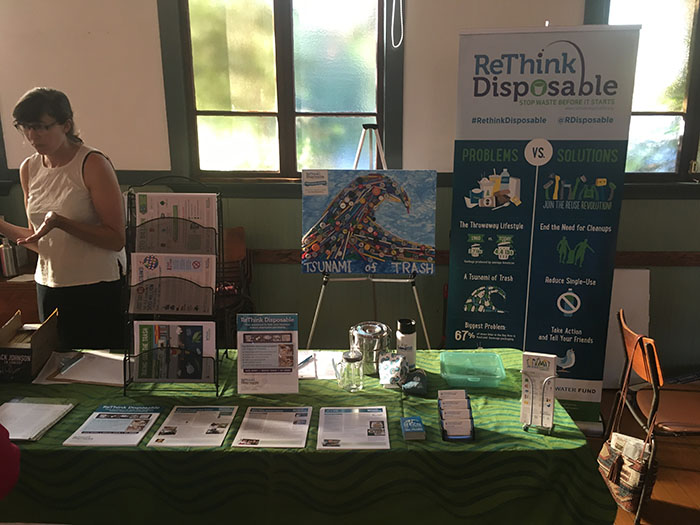
Here at ReThink Disposable, it’s sometimes easy for us to get stuck in the weeds focusing on how to help businesses and institutions save money by reducing their reliance on single-use disposable products. For example, I might spend hours in a spreadsheet looking at how many straws a business used.
But, when you look up from the spreadsheet, there’s a growing public movement of plastic pollution champions, and we’re delighted to be part of it. Case in point? Plastic Free July.
Plastic Free July is a global movement meant to inspire people to take action and reduce the use of single-use disposable plastics, so that plastic stays out of the ocean and our bodies. This Plastic Free July, our program, ReThink Disposable, co-sponsored the Berkeley Ecology Center’s Plastic Free July events. I went to a screening of Smog of the Sea, educated folks at a clean-up event at Shorebird Nature Preserve, and tabled the Plastics In Your Food panel discussion where our program manager, Samantha Sommer, took part in a discussion about the impacts plastics have, and what we can do about it.
At all these events I was asked one question, more than any other: “How Can I Help?”
It means people are ready to take action in the face of an extraordinary problem: Recent research shows we have created over eight billion metric tons of plastic since the 1950s. Of all that, we have only recycled 9%, we have incinerated 12%, the rest is either sitting in a landfill or elsewhere, like the ocean.
Plastic is no longer an outside problem, only. We find it in the food we eat. As plastic is carried along ocean currents, it is broken down into tiny fragments by wave action and sunlight. These very small pieces are about a quarter of the size of your pinky nail, and often much smaller than that. Animals like small fish, shellfish, and zoo plankton consume these plastic fragments and are in turn eaten by larger animals, and so the plastics make their way up the food chain, eventually ending up on our dinner plate. The San Francisco Estuary Institute found that a quarter of the fish and shell fish caught in the waters around the San Francisco Bay Area had consumed plastic. We are now eating our own trash.
Even though the facts can be quite discouraging, I cannot help but feel inspired and enlivened when I show up to a community event and I meet so many folks who want to do something, who want to get involved, who want to make a difference. In response to the question, “how can I help?” I say: talk to your friends and neighbors about plastic pollution; eliminate or minimize your use of single-use disposable packaging (especially food ware) and teach others how to do the same; volunteer for or donate to organizations working on this issue; and stay inspired.
It’s hard to stay inspired – at least, I find it hard. But when I meet you and you ask me “what can I do?” or “how can I help,” I am reminded why it is I do what I do, and I am reminded that I am part of global movement.


